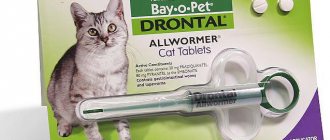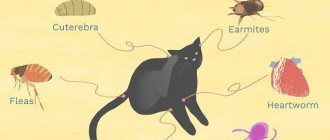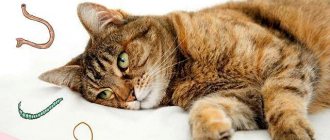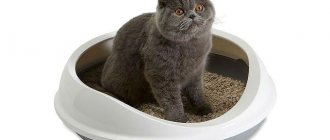What will you learn from the article?
- Where does a cat get worms?
- Symptoms
- Types of worms Tapeworms (cestodes)
- Roundworms (nematodes)
- Flukes (trematodes)
- Medicines for helminths
Helminths (worms in cats) are a very common parasitic disease that can pose a serious threat to the health and life of a pet. From this article you will learn what to do in case of helminthiasis, how to deworm (what anthelmintic drugs to give) and, most importantly, how to prevent your cat from becoming infected with parasites.
Where does a cat get worms?
Worm larvae and adult parasites are found in the environment: in the soil, on the grass, in water bodies. Therefore, it does not mean at all that if your cat is an indoor cat and does not go outside, then he cannot become infected with worms. You yourself can bring the larvae on the soles of your shoes or on your clothes.
Other sources of infection:
- when your cat eats raw fish, meat, or tap water;
- when fleas appear, there is a possibility of your pet becoming infected with worms;
- upon contact with sick animals, contaminated objects (sand, soil) and feces;
- Intrauterine infection of kittens from a pregnant cat is possible.
How can parasites settle in a cat's body?
This point often worries owners of domestic cats. The answer is quite simple - your pet’s diet contains raw fish or meat, waste, flies, all of which can cause infection. In addition, mother cats can transmit helminths to their kittens through milk.
Read more: “Proper nutrition for cats”
Worms can easily pass from cats to humans through skin tissue or fleas.
The presence of special signs of infection in an animal is determined by the degree of disease and the number of parasites in the cat’s body. Symptoms differ between cats and small kittens, and this is also influenced by the type of helminth present. The main signs of the presence of worms can be:
- vomit;
- diarrhea or frequent constipation;
- Individual larvae or even worms may be observed on the cat’s fur or near the anus;
- kittens and cats may be bothered by itching of the anus;
- there is stool with blood or mucus;
- round and dense belly;
- long-term weight loss;
- changes in appetite;
- cough, difficulty breathing;
- heavy shedding;
- underdevelopment of the kitten’s physical characteristics;
- fast fatiguability;
- pallor or yellowness of the mucous membranes;
- premature birth.
Cat owners need to take into account that these symptoms are similar to signs of various infections. If the cat is dewormed at this point, the course of the infection may become more complicated, which in some cases leads to death. In this case, it is necessary to establish an accurate diagnosis; this can only be done by a qualified veterinarian. In our Murkosha shelter, animals can receive timely and professional help.
Read about how to help your cat here: “Signs of an Unhealthy Cat”
If a pet owner suspects that their cat has worms, it is necessary to treat it immediately. You shouldn’t delay this, since the appearance of several signs of worms immediately indicates that parasites are already living in large numbers in your cat’s body.
Symptoms
- The presence of fleas is a direct sign of the appearance of worms in a cat.
- Invasive parasites can live not only in the intestines, but also in the bronchi, muscles, and liver, so a number of symptoms may be observed indicating the presence of helminths:
- general exhaustion of the body;
- dull coat;
- lethargic state of the pet;
- refusal of food or, conversely, increased appetite;
- thirst;
- weight loss;
- vomiting and diarrhea (the presence of parasites can be seen in vomit or feces).
- Small rashes around the anus.
- Kittens have swollen bellies, very pale mucous membranes (due to anemia), an upset stomach is replaced by constipation, bloody diarrhea.
What to do if your cat spits out medicine
Zoologists say: refusal to take a drug is an absolutely normal reaction of a healthy animal, which must be accepted.
If your pet categorically refuses the medication and spits out the pills, you can postpone the procedure for a short time. Wait until your cat calms down before trying to give her the medicine again.
Also, instead of tablets, you can give another form of the drug: drops, suspensions, pastes.
Types of worms
The following types of worms parasitize cats. Each type has its own symptoms and routes of infection.
Tapeworms (cestodes)
Long and flatworms can reach a length of up to 70 cm. The body of these worms consists of many segments, in each of which larvae mature.
When the larvae mature, they separate and come out together with the feces, while the segmented body of the parasite grows continuously, and new segments with larvae appear to replace the separated segments.
Routes of infection
Cats become infected with this type of worms by eating raw meat and fish. Stray animals often become infected with cestodes by eating rats or mice. Infection through larval carriers, fleas, is also possible. Helminths parasitize the walls of the cat's small intestine.
Signs of tapeworm infestation:
- changes in the pet’s body weight (the weight either increases sharply, or the cat, on the contrary, rapidly loses weight);
- change in appetite (the cat is insatiable or, on the contrary, refuses food);
- large, “inflated” belly;
- hair loss;
- Excessive licking in the anal area.
Why are they dangerous?
The cat's gastrointestinal tract becomes clogged with worms, causing intestinal obstruction. Possible death.
As you can see
It is very common to see tapeworm segments around the anus of a sick animal - these segments resemble grains of rice or sesame. Also, individual parts of cestodes are found on the animal’s bedding. In a more severe form of worm infestation, parasites can be seen in the vomit.
Roundworms (nematodes)
The most common type of internal parasites that infect cats. There are many varieties, but the most common in our pets are roundworms. In appearance, the parasites resemble spaghetti, which is where the name “round” comes from. The length of roundworms usually reaches 5 cm, but longer individuals are also found.
Routes of infection
Kittens can become infected with roundworms through their mother's milk. The danger of infection lies in wait for an adult cat when eating rodents, raw meat and in contact with an infected animal.
Signs of roundworm infection:
- weight loss;
- enlarged belly;
- vomit;
- diarrhea;
- general weakness.
Why are they dangerous?
Worms accumulate in the small intestine, injure the gastric mucosa, and can clog the bile ducts and intestines. They can parasitize almost all organs of the animal, having a strong toxic and allergic effect on the body.
As you can see
With intense helminthic infestation, nematodes can be seen in sputum after coughing or in vomit. Roundworm eggs can accumulate in the folds around the animal's anus.
Flukes (trematodes)
Parasites that can be localized anywhere: in the gastrointestinal tract, liver, bile ducts, respiratory organs. These are flatworms with suckers, with which they are firmly attached to the tissues of internal organs, most often the liver. With these suckers, hermaphrodite worms attach to the tissues of the cat's internal organs, eating and destroying them.
Routes of infection
Infection occurs by eating raw fish, seafood or through raw water.
Symptoms of fluke infection:
- cough;
- dyspnea;
- jaundice;
- vomit;
- weight loss;
- diarrhea;
- painful stomach;
- depressed state.
Why are they dangerous?
The activity of parasites disrupts the patency of the bile ducts, causing cirrhosis and liver failure. This can cause lethargy and death.
As you can see
The moving parts of the flukes can come out through the cat's anus. If you look closely, you can see tiny translucent parts of the parasite around the animal's anus, on its bedding.
AVZ anti-worm preparations for kittens
Suspensions
- Suspension "Dironet Junior".
The main active ingredients are pyrantel and sodium ribonucleate, as well as excipients. The product is used for the prevention and treatment of various nematodes (toxocariasis, toxascariasis, uncinariasis, hookworm infection, trichocephalosis). - Suspension "Dironet".
The drug contains active ingredients such as pyrantel, praziquantel, and ivermectin. The suspension is aimed at combating ectoparasites, as well as round and tapeworms.
These medications can be prescribed from 3 weeks of age.
Pills
- Tablets for cats and dogs “Azinox” (from 3 weeks).
Their main active ingredient is praziquantel. The product is active against tape parasites at all stages of development. - Tablets for cats and dogs “Alben S” (from 3 months).
A complex drug containing praziquantel and albendazole. It has nematodocidal and cestodocidal effects, which are aimed at all phases of development of round and tapeworms. It is the drug of choice for the treatment of resistant helminthiases. - Dironet 200 tablets for cats and kittens (from 3 weeks).
One tablet contains pyrantel, praziquantel and ivermectin. A wide spectrum of anthelmintic action allows you to fight round and tapeworms. - "Febtal tablets" for cats and dogs (from 3 weeks).
The composition includes a single active ingredient - fenbendazole, which has a wide spectrum of action. The drug is used as a treatment and prophylaxis for various nematodes and cestodes, both adult forms and larvae and eggs in the gastrointestinal tract and lungs, as well as cestodes. It has the least contraindications and can be used by pregnant women.
Diagnostics
A final diagnosis can only be made by a veterinarian after studying the anamnesis and taking the animal’s feces and blood for analysis. A stool sample is collected for three consecutive days to rule out a “false negative diagnosis.”
If the owner notices particles of worms in the cat’s feces or on the animal’s body, then this should also be reported to the veterinarian.
Important!
Please note that parasite larvae may persist in the milk of nursing cats. Therefore, even if the mother cat has a negative test for worms, it is necessary to carry out thorough anthelmintic therapy for the babies.
How to give the suspension
Giving a suspension to a cat is no easier than giving tablets, since in no case does it want to swallow what a caring owner offers it. She begins to salivate excessively. On the face you get a whole beard from the medicine.
- To give your cat or kitten a suspension, you can try mixing it with your pet’s favorite food: pate, minced meat, sour cream. This must be done with a small amount of food in order to accurately control the dose of the drug eaten.
- Everyone knows that cats are very clean animals. The anti-worm suspension can be spread on your pet’s paws. He will diligently begin to lick them. This way he will lick the entire dose of the drug and save both himself and the owner’s nerves.
Antihelminthics for cats
Anthelmintic drugs are prescribed for medicinal purposes by a veterinarian after all tests have been carried out, the type of parasites, the location and degree of helminthic infestation have been determined.
The doctor must select the brand and form of a targeted drug that acts on a specific type of worm. Or prescribe a medicine with complex action if the cat is infected with several types of helminths or the type of worms could not be determined.
For the purpose of prevention, anthelmintic drugs for cats are prescribed 2-4 times a year. It is mandatory to carry out antiparasitic treatment before mating, before vaccinations and simultaneously with anti-flea drugs.
Medicines for helminths
In veterinary pharmacies, anti-worming drugs for cats with targeted and complex action are widely available in various forms of release:
- Drops on the withers are the most popular products, characterized by quick action and ease of application. The drops are applied to the withers and between the animal's shoulder blades - there is no need to force the cat to drink the bitter medicine.
- Profender (Bayer) - price in Russia for 1 pipette 350-450 rubles / in Ukraine 110-230 UAH);
- Dironet Spot-on (Agrovetzaschita) – price in Russia 350 rubles / in Ukraine 160 UAH.
- Stronghold (Pfizer) – price in Russia 1150 rub. / in Ukraine 550 UAH.
- Anti-worm tablets - given to the animal along with food or “in its pure form”. Preparations with high effectiveness of a complex and targeted (for one type of worm) remedy. Individual selection is possible taking into account the type of parasites, the degree of infestation and the condition of the cat.
- Kanikvantel plus - price in Russia 195 rubles / in Ukraine 70 UAH;
- Enwire - price in Russia 165 rubles / in Ukraine 78 UAH;
- Drontal (Bayer) – price in Russia 320 rubles / in Ukraine 179 UAH;
- Milbemax – price in Russia 330 rubles / in Ukraine 145 UAH;
- Pratel - price in Russia 38 rubles / in Ukraine 6 UAH;
- Trontsil - price in Russia 215 rubles / in Ukraine 15 UAH;
- Febtal – price in Russia 150 rub. / in Ukraine 71 UAH.
- Suspensions or pastes are given to the animal orally using a dispensing syringe. It is convenient to dose and give to cats that refuse to eat tablets.
- Prazicide for adult cats - price in Russia 108 rubles / in Ukraine 45 UAH;
- Prazicide sweet suspension for kittens - price in Russia 127 rubles / in Ukraine 38 UAH.
- Sugar cubes - given to the animal as a treat, with food, or dissolved in water and fed to the animal through a syringe. Animals willingly eat the medicine.
- Polyvercan - price in Russia 605 rub. / in Ukraine 310 UAH.
How to use an anthelmintic drug correctly
- modern drugs for preventive purposes are given once in the morning, a preliminary fasting diet is not required;
- when treating worms in a cat, the drug must be given again after 10-14 days;
- before each vaccination, it is necessary to give antihelminthic drugs 10-15 days before the expected date of vaccination;
- you also need to give antihelminthic drugs 3 weeks before childbirth and 3 weeks after;
How to deworm kittens
- It is not recommended to give anthelmintic drugs to kittens younger than 8 weeks;
- kittens are dewormed for the first time at the age of 2 months, when the body is stronger and can perceive the toxic substances of anthelmintic drugs;
- the drug is chosen on the recommendation of a veterinarian, the dosage is calculated based on the age and weight of the kitten;
- repeat the procedure 10-14 days after the first dose.
Folk remedies
Traditional medicine for worms in cats does not have proven effectiveness and is presented in the article for informational purposes.
- Give a decoction of chamomile or fennel to drink instead of water.
- Cut the onions into 4 parts and pour a glass of warm boiled water. Give your cat this water to drink in the morning on an empty stomach for 7 days.
- Common tansy. Pour 1 tablespoon of flowers with a glass of boiling water and leave for 1 hour, then strain. Give the cat this infusion 2-3 times a day, then feed it no earlier than 30-60 minutes later.
- Alcohol tincture of wormwood is used 10 drops 2 times a day. Feed the cat no earlier than every 30-60 minutes.
- Carrot juice enemas (20 ml) once a day for a week.
Basic methods of giving medicine to a cat
Mix with food
This method can be used after first finding out whether the positive effect of taking the tablet will disappear after mixing. This can be read in the instructions for the medicine.
- The tablet must be pre-crushed.
- Mix with your cat’s favorite food, taken in small quantities.
- Make sure that the food is completely eaten. If the cat did not eat everything, then we can say with confidence that the required dose did not enter the animal’s body.
- You can try dividing the tablet into two parts and fixing it either in a sausage or in boiled minced meat. It is important that the lined pieces are small. This is required so that the cat does not chew them, but swallows them whole.
Using butter
Even with a strong desire, the cat will not be able to spit out the tablet. Thanks to the butter, it slips into the throat.
- If the tablet is small, then it needs to be dipped in butter.
- Place the cat as close to the root of the tongue as possible.
- If the tablet is large, it must first be divided into parts.
Prevention
The disease is easier to prevent than to treat, and therefore, to minimize the risk of your cat getting worms, do the following:
- Preventive use of antiparasitic drugs for fleas, ticks, and worms once every 3 months. First we use anti-flea products, after 3 days - against worms.
- Do not feed the animal raw meat, drink only boiled/settled water.
- Avoid contact with street animals.
- Regularly carry out antiparasitic treatment of the cat's place and scratching posts. Keep your cat's grooming supplies clean.
- Clean your house/apartment regularly and take off your shoes in the hallway.
Important!
Remember that most of the helminths that infect cats are also dangerous for humans, so if your pet is found to have parasites, worry about your health too.
Folk remedies
Preference should be given to low-toxic folk remedies when treating pregnant cats, pets weakened by diseases, and small kittens. It is these products that are characterized by the most gentle effect on the body and are a safe alternative to chemical drugs. However, in this case, you need to remember that the process of getting rid of helminths will be lengthy:
- Using garlic is the most effective and affordable option for ridding your pet of worms. Crushed garlic cloves are mixed into the animal's food for a week. If your pet refuses such a “treat,” then a good alternative would be to use an enema based on garlic tincture;
- the use of tansy and wormwood is an equally effective way to deworm a cat. In this case, a tincture is used, for the production of which a tablespoon of crushed plants is poured with a quarter liter of boiling water, cooled at room temperature for an hour and filtered. The infusion is given to the pet in the morning, for one week, an hour before giving food;
- Using carrot juice is a convenient and quite effective way to get rid of helminths. Freshly squeezed juice is administered to the pet using an enema, once a day, for a week and a half;
- the use of pumpkin seeds to make a tincture is one of the most popular and affordable ways to rid an animal of any type of worms. To prepare your own folk remedy, just peel the pumpkin seeds, chop them, add water at room temperature, leave and strain. You need to add a little honey to the filtered infusion. The product is given to the pet half an hour before meals or used to perform enemas;
- the use of a herbal infusion based on tansy flowers, wormwood, peppermint, buckthorn bark and wild carrot seeds is highly effective. A couple of tablespoons of the mixture are poured into a quarter liter of boiling water, after which it is infused to room temperature, filtered and given to the animal three times a day for three days.
One of the very affordable ways to deworm any pet, including a cat, is to use folk remedies based on onions. It is enough to chop one small onion and pour the pulp with a glass of boiled water at room temperature. The product is used on an empty stomach, early in the morning, for a week.
Return to content
Owner stories
Sofia: “We adopted a cat from a shelter. It turned out that the cat had worms. Moreover, there were a lot of them, all the feces were strewn with larvae and parts of parasites, such small white things. We suffered with her until the veterinarian advised us this treatment regimen: Kanikquantel suspension three times with an interval of 2 weeks. We're doing well now."
Tamara: “My son brought a kitten from the street. I immediately realized that the cat had worms - the baby’s tummy looked like an inflated balloon. Poor thing, he suffered while he was a wanderer. The veterinarian said to give Prasitab tablets. One tablet is designed for an animal weighing 4 kg. I gave a little less than half, crushed it into powder and diluted it with water. This mixture was poured into the baby using a syringe without a needle.”
If after treatment the animal is poisoned
As a rule, possible complications after treatment for worms arise due to poisoning of the body, provoked by the decomposition of dead parasites inside the cat. Malaise sometimes occurs due to inaccurate dosage of medications used to treat an infected pet, as well as due to intolerance to a particular medication. If vomiting occurs, the cat has difficulty breathing, muscle tremors or increased lethargy are observed, it is necessary to urgently call a veterinarian.
At the Murkosha shelter, worms are poisoned from admitted kittens only after all possible infections have been excluded and under the strict supervision of a veterinarian. Treatment should begin no earlier than 2 weeks after you take the kitten into your home, provided that it is absolutely healthy. Also, you should not immediately use different drugs - for helminths, fleas, ticks, etc., otherwise intoxication cannot be avoided.











